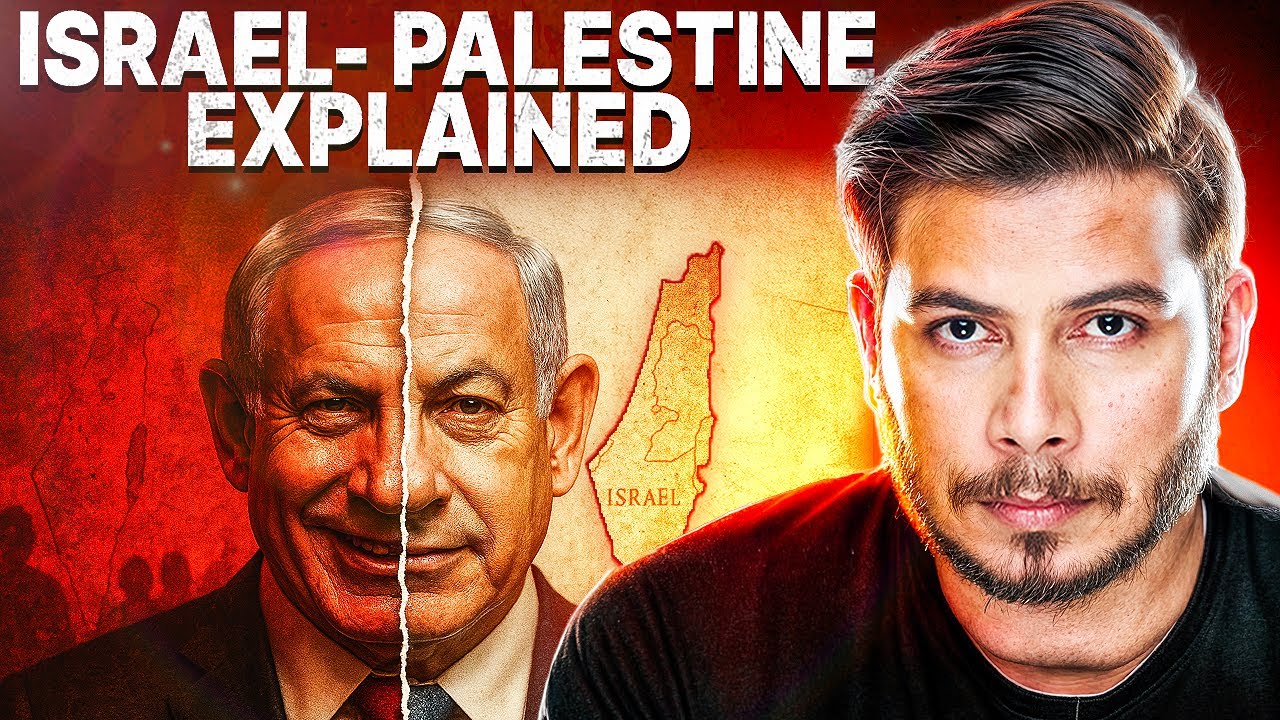From the River to the Sea, Palestine will be Free | Explained
Summary
TLDRThe video script explores the contentious slogan 'From the river to the sea, Palestine will be free,' examining its implications for the Israeli-Palestinian conflict. It delves into the slogan's origins, the varying interpretations that range from a call for coexistence to a demand for Israel's destruction, and the historical context of the conflict. The script also discusses the complexities of the two-state solution, the impact of extremist groups on peace efforts, and the current challenges in achieving a peaceful resolution, emphasizing the intertwined destinies of Israelis and Palestinians.
Takeaways
- 📢 The slogan 'From the river to the sea, Palestine will be free' has sparked controversy and confusion, with different interpretations leading to polarized views.
- 🗣️ Some view the slogan as a call for peaceful coexistence and harmony, while others see it as a demand for the elimination of Israel.
- 😕 Many people, including some who chant the slogan, are unaware of the geographical specifics it refers to, indicating a lack of understanding of what they are advocating for.
- 🌍 Geographically, 'from the river to the sea' refers to the area between the Jordan River and the Mediterranean Sea, which currently includes the state of Israel.
- 🏛️ Historically, the United Nations had proposed a two-state solution for the region, which was not fully realized and has led to ongoing conflict.
- 🏗️ The call for a single democratic state in the region faces significant challenges due to deep-rooted identities and historical tensions between Israelis and Palestinians.
- 🔄 The script highlights the complexity of the Israeli-Palestinian conflict, showing that it's not just about modern nation-states but also about ancient identities and aspirations.
- 🗣️ The script points out that the original Arabic slogan has different versions, some of which explicitly call for an Arab or Muslim Palestine, contradicting the idea of a democratic state for all.
- 📜 Historical documents, such as the PLO's 1968 charter, reveal that the initial goal of some Palestinian factions was the destruction of Israel, not coexistence.
- 🕊️ The 1990s brought a brief period of hope with peace talks and mutual recognition between Israel and the PLO, but these efforts ultimately failed due to extremist opposition and internal conflicts.
- 🚨 Recent events, such as the 2023 Hamas attack on Israel, have led to a resurgence of violence and a return to the zero-sum mentality of 'either a free Palestine or Israel'.
Q & A
What slogan has caused controversy and is associated with the Palestinian cause?
-The slogan 'From the river to the sea, Palestine will be free' has caused controversy and is associated with the Palestinian cause.
What does the phrase 'From the river to the sea' imply according to some interpretations?
-Some interpretations suggest that the phrase implies the establishment of a Palestinian state in the entirety of the land between the Jordan River and the Mediterranean Sea, which would mean the elimination of Israel.
What does the phrase 'From the river to the sea' imply according to other interpretations?
-Other interpretations suggest that the phrase calls for a single, democratic state where Jews and Palestinians would live together with equal rights.
What historical proposal is mentioned in the script that aimed to resolve the Israeli-Palestinian conflict?
-The script mentions the United Nations' proposal for separate Jewish and Arab states, which included Jerusalem under United Nations trusteeship.
What does the acronym 'PLO' stand for, as mentioned in the script?
-PLO stands for Palestine Liberation Organization, which is a group active in the Palestinian cause.
What does the script suggest about the understanding of the slogan 'From the river to the sea' among the general public?
-The script suggests that many people chanting the slogan 'From the river to the sea' do not fully understand its implications or even which river and sea are being referred to.
How did the script describe the historical conflict between Israelis and Palestinians?
-The script describes the historical conflict as a zero-sum game where the existence of one state meant the destruction of the other, with deep-seated identities and aspirations on both sides.
What significant event is mentioned in the script that took place on October 7th, 2023?
-On October 7th, 2023, Hamas invaded southern Israel, leading to a significant escalation in the conflict and a harsh response from Israel.
What does the script suggest about the feasibility of a one-state solution for Israelis and Palestinians?
-The script suggests that a one-state solution is not feasible because both Israelis and Palestinians have deeply rooted identities and are not interested in sharing a single state.
What does the script imply about the current state of the Israeli-Palestinian peace process?
-The script implies that the peace process is in a state of disarray, with both sides becoming more entrenched in their positions and the situation deteriorating.
What is the script's stance on the use of the slogan 'From the river to the sea' on college campuses?
-The script suggests that the use of the slogan on college campuses has led to chaos and controversy, with some interpreting it as a call for the destruction of Israel.
Outlines

此内容仅限付费用户访问。 请升级后访问。
立即升级Mindmap

此内容仅限付费用户访问。 请升级后访问。
立即升级Keywords

此内容仅限付费用户访问。 请升级后访问。
立即升级Highlights

此内容仅限付费用户访问。 请升级后访问。
立即升级Transcripts

此内容仅限付费用户访问。 请升级后访问。
立即升级浏览更多相关视频
5.0 / 5 (0 votes)






